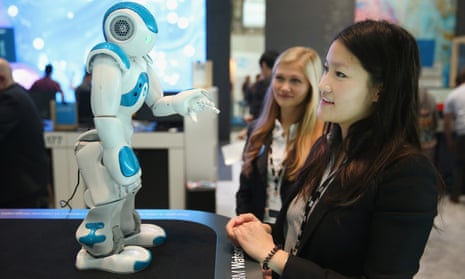Elon Musk, founder of SpaceX, Tesla and PayPal, is worried about killer robots. “You know those stories where there’s the guy with the pentagram and the holy water, and he’s sure he can control the demon?” he has warned. “Doesn’t work out.”
That “unfriendly AI”, as it is known in tech circles, would not be a boon for humanity is an easy cause to get behind. But unlike Musk – a tech entrepreneur who stands to make huge financial gains from AI in the short term – most of us don’t have the luxury of taking the long view.
The defeat, last week, of one of the world’s strongest Go players, Lee Sedol, demonstrates the qualitative leap in AI that has already taken place. The programme, developed by Google DeepMind, was not preprogrammed with killer moves, nor did it win by dint of an ability to crunch through all the possible moves at lightning speed.
AlphaGo, learned by playing millions of games against itself, developing such an individual style of play that its own human creators were “pretty shocked” by some of its moves. It could be this is the turning point for AI.
Google has made no secret of its ambition to turn the same type of deep-learning software to significant real-world applications such as healthcare, transport and climate change research. The new insights that AI would bring to these areas could be considerable, but policy-makers need to ensure that the technology benefits society at large and not just the elite owners of robots.
George Osborne is expected to announce in this week’s budget that driverless cars will be tested on Britain’s motorways as soon as next year. Yet the laws around liability for autonomous cars remain hazy. If an obstacle appears suddenly in the road, will Google’s vehicle be able to distinguish a plastic bag, a pigeon and a child? In a lethal accident, who will be to blame – the car owner, the manufacturer, or even the robot itself?
Lord Martin Rees, astronomer royal and co-founder of the Centre for the Study of Existential Risk at the University of Cambridge, predicts: “The number of accidents will probably go down, but litigation will go up. People are less forgiving towards machines.”
Similar questions arise around medical diagnosis and care. Software is already being introduced to remind patients to take their medication via text message or to process repeat prescriptions. It is only a matter of time before machine intelligence is being used more widely to improve diagnosis and treatment for everything from cancer to dementia.
Safeguards will be needed to make sure that these changes benefit patients and are not simplyused as cost-saving measures by stretched public health services. These tools need to be scrutinised ethically as well as scientifically – would we be comfortable with a diagnostic tool that saved lives overall, say, but discriminated against certain groups of patients? Should doctors be compelled to conform to the advice provided by a robot?
AI is already rapidly creating jobs, while destroying others – it is not yet clear how this will balance out in the long run. Robots could soon surpass humans at routine legal work, language translation and medical diagnosis, for instance, but gardeners, plumbers and physiotherapists may be harder to replace.
“We may need massive social redistribution of wealth so the benefits don’t just go to the elite owners of robots,” says Prof Rees. “Public service jobs that are under-resourced and underpaid need to be upgraded.”
The threats of job insecurity and the need for regulation of AI may lack the apocalyptic quality of Musk’s warnings about robots gone rogue. But these issues need tackling now to ensure that we place human values above money and convenience when applying this powerful new technology.
